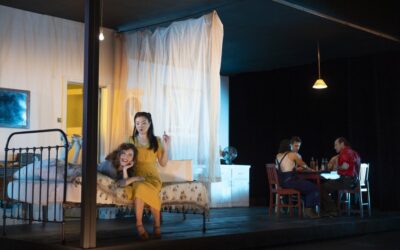By Darby Turnbull
A Leah Shelton performance is an event to be experienced if you have the means and opportunity, fortunately for local audiences her new show Batsh*t playing at Darebin Arts is an exhilarating and often poignant platform for her immense skill and status as a performance artist. In the early 1960’s, Leah’s grandmother Gwen was involuntarily admitted to a psychiatric institution in Perth after withdrawing emotionally from her family and experiencing religious fixations which she describes as a calling. She was subsequently diagnosed with schizophrenia and subjected to incredibly invasive treatment including institutionalisation, medication with adverse side effects and ECT. By Leah Shelton’s own admission, she’s not intimately acquainted with Gwen’s experience from her own testimony and her depiction is informed by her medical records, a few letters and interviews with her mother, Christine which feature in the performance via recording. Therefore, Gwen’s experience is used in a broader depiction of the ways women (mostly cisgender women) are deemed ‘crazy’ in this case broadly contextualised within media and pop culture. Shelton with morbidly insightful humour places Gwen’s experiences within a very specific period of social change; the 1960’s being a key period of exposing the drudgery, boredom, isolation and personality diminishment of being a housewife. Shelton includes an extended TV street interviews from the period. Gwen’s ‘treatment’ was informed by a patriarchal, colonialist medical system, the damaging ramifications are still being faced to this day. The patronising rhetoric of the doctors is played straight and satirised by Shelton with the gut punching indictment that Gwen’s ‘recovery’ was linked directly to her being able to perform home duties and be sexually compliant to her husband.
Shelton, her acclaimed director Ursula Martinez with dramaturgical consultancy from Saffron Benner; create some dazzling interconnected vignettes using familiar pop cultural depictions of mental illness, with an emphasis on the horror genre, to showcase Shelton’s indomitable skill as a physical performer (Kate Harmen is credited as choreography consultant), vocalist and lip sinker. Judy Garland, Barbra Streisand, Patsy Cline, Britney Spears, Hannibal Lector and most recently Amber Heard, among many others are referenced or interpreted through the lens of other people’s interpretations of their mental health. An early highlight features Shelton doing a high camp performance of ‘Get Happy’ obstructed by a medical gag as well as a stunning tulle gown and Mary Jane heals. Cunningly she also makes direct parallels to the sexual objectification of female mental illness. The elation of the male gaze; as long as they get to enjoy the spoils and not the emotional responsibility to her dignity or autonomy.
As befits her status as internationally renowned performance artist, the production values showcase modest, yet impressive resources needed to bring to life Shelton’s vision and each member of the creative team is working at the top of their game to make it pop. Each moment is carefully timed, and the operators need to work concurrently with the performer to make them land, and succeed with aplomb. Kenneth Lyons intensive sound design showcases a plethora of song cues, jump scares and quiet grace, Jason Glenright’s lighting cleverly incorporates sterile fluorescent light with poppy kineticism. Shelton’s costume designs use classic images of inpatient restraints; straightjackets, hospital gowns; with some ingenious ways of subverting her mobility with false limbs so that despite the appearance of restriction she’s still in control. The set is utilising a tricked out old fashioned television and ‘fainting couch’ for some delightful stage tricks which I won’t spoil here. Shaun Caulfield is credited with Scenic Art and Freddy Comp and Stephen Rowan with construction.
The combination of Shelton’s dazzlingly electric stage persona and production values in service of a commendable, important artistic statement couldn’t help but leave me with some divided opinions about where the piece sits within a wider socio-political context. The implication is that the audience is coming in with limited psychoeducation and knowledge of the history of psychoeducation. Given some of the responses I heard last night from the audience, people interviewed for this production (Grace Uther provided video content), that’s entirely fair, everyone brings their own level of baggage and experience to a performance which is what makes it thrillingly unique.
The ‘baggage’ I’m bringing to this performance is working within mental health inpatient and community services (in a non-clinical role) often working alongside individuals with schizoaffective or schizophrenia diagnoses; some of whom remember the old asylums, and I have strong ties to the Lived Experience movement. As someone with a lived experience of chronic mental health conditions as well (it’s an insight into how far we’ve moved that my treatment in the mental health system is radically different from my peers in decade past for the same experiences) I have skin, or rather neurons in the game.
One thing I’ve reflected of late is that depictions of mental health conditions, especially debilitating ones come from the perspectives of those who lived to tell their tale. Either they’re filtered through the lens of family or care givers or those who have the means, ability and opportunity to provide a testimony. Both come from a certain level of social privilege given that a notable occupational hazard of mental illness is poverty and a pervasive culture of silence either by intention (some people don’t to tell their stories) or design, because it conflicts with a certain narrative that upholds power structures.
Given that her entry into this subject matter is incredibly specific, Gwen had access to certain privileges (class, race) which did not save her from maltreatment, Leah’s focus in performance is somewhat limited. Which wouldn’t give me pause if she wasn’t making a case for some universality of experience and drawing connections with famous people whom the audience will have a familiarity with to get her point across. Famous women are often scapegoated for larger misogynistic purposes, Amber Heard is cited in this performance given the recent vile public commentary and public opinion of her experiences being used to dismiss other women’s experiences because public opinion isn’t on her side. What I struggle with in the broader conversation and at moments in this performance is the complex nuance of how mental health and mental health treatment experiences are given a certain equivalency especially when the people most affected aren’t speaking for themselves but are being represented by second or third parties. I struggle with opinions and observations about an individual being made without their input.
What I have no qualms commending however is Shelton and her Company’s searing indictment of a system that has and is still being used to uphold harmful power structures, but empathy, connection and social justice are making incremental changes.
The success of this performance, I believe, relies on Shelton facilitating her audience in sitting with discomfort whether it be different stages of learning, internal bias, stigma, ethics or a reminder of just how far we have to go.
People who have the resources to attend should absolutely go and sit with this divisive experience and also purchase one of Shelton’s ‘ Bring the Axe’ t-shirts. I did and I’ll be wearing it all summer.




